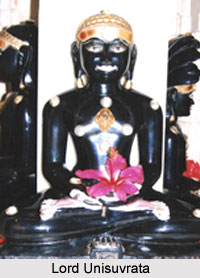 Lord Unisuvrata Swami was the twentieth Jain Tirthankara of the current age, Avasarpini. As per Jain philosophy, he became a siddha, an enlightened soul which has demolished all of its karma.
Lord Unisuvrata Swami was the twentieth Jain Tirthankara of the current age, Avasarpini. As per Jain philosophy, he became a siddha, an enlightened soul which has demolished all of its karma.
Munisuvrata was born to Emperor Sumitra Raja and Queen Padmavati Rani at Mithiia in the Hari Vansh clan. His birth date is on the 15th day of the Shravan Sukla month of the Hindu calendar. The being that was to be Lord Munisuvrat purified its soul during his birth as Surshreshta. He was then the Emperor of Champa city in Mahavideh. After completing his age he reincarnated in the Pranat dimension of Gods.
The period of Lord Munisuvrat`s was regarded as one of the prominent period of Jain prehistory. The illustrious contemporaries and devotees during his time include stalwarts like the ninth Chakravarti- Mahapadma, the eighth Prativasudev, Baldev, and Vasudev, Ravana, Lord Rama and Lakshman respectively. Ascetic Vishnu Kumar, the elder brother of Lord Munisuvrat also earned name and fame for his pioneering work of saving the Jain organization from the oppressions of mister Namuchi. The famous festival of Raksha Bandhan is celebrated in the memory of that event.
This article is a stub. You can enrich by adding more information to it. Send your Write Up to content@indianetzone.com




















